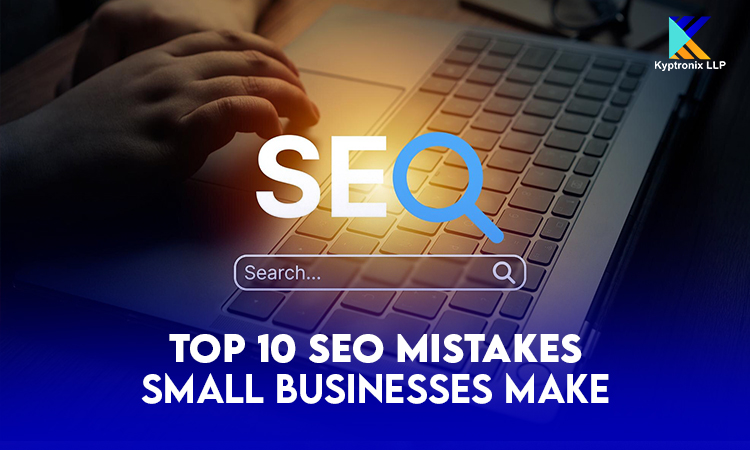

In today’s digital landscape, a strong online presence is crucial for small businesses. However, achieving this requires more than just launching a website. Search Engine Optimization (SEO) plays a pivotal role in helping small businesses attract and retain customers online. Unfortunately, many small businesses unknowingly make SEO mistakes that can hinder their growth and visibility. Let's explore the top 10 SEO mistakes small businesses often make and how to avoid them.
For any startup, establishing credibility is one of the first and most important steps toward success. A professional website plays a vital role in this process. It acts as a digital storefront, offering visitors a first look at your business. Just as a physical store with clean windows, organized shelves, and friendly staff would attract customers, a well-structured website can do the same in the online world. Working with a reliable Website Design & Development Company ensures that your site is optimized for credibility.
Local SEO is critical for small businesses that rely on local customers. Many small businesses neglect optimizing their online presence for local search results, missing out on potential customers in their vicinity. Make sure to claim your Google My Business profile, use local keywords, and encourage satisfied customers to leave positive reviews. Include your business’s name, address, and phone number (NAP) consistently across all online platforms.
With the majority of searches now happening on mobile devices, a mobile-friendly website is no longer optional—it's essential. Websites that aren’t optimized for mobile not only frustrate users but are also penalized by Google’s mobile-first indexing. Ensure your website is responsive, loads quickly on mobile devices, and provides a seamless user experience. This will improve your site’s ranking and keep potential customers engaged.
On-page SEO involves optimizing individual pages to rank higher in search engines. Neglecting essential elements like title tags, meta descriptions, header tags, and image alt text can severely affect your search engine rankings. Make sure each page has a unique title tag and meta description that includes relevant keywords and accurately describes the content. Header tags should be used to structure content, making it easier for search engines and users to understand.
Content is king, but quality reigns supreme. Some small businesses make the mistake of producing low-quality content stuffed with keywords. Search engines like Google are getting smarter and prioritize content that provides value, is well-written, and answers users' queries. Focus on creating informative, engaging, and high-quality content that establishes your expertise and builds trust with your audience.
Technical SEO is often overlooked by small businesses, but it is crucial for website health and visibility. Issues like slow loading speeds, broken links, poor site structure, and lack of an XML sitemap can prevent search engines from properly crawling and indexing your site. Regularly audit your website to identify and fix technical issues, ensuring a smooth user experience and improving search engine rankings.
Backlinks are a significant ranking factor in SEO. However, many small businesses either overlook building backlinks or rely on low-quality links, which can do more harm than good. Focus on acquiring high-quality backlinks from reputable websites relevant to your industry. Engage in guest blogging, create valuable content others want to link to, and build relationships with industry influencers to boost your backlink profile.
SEO is not a one-time effort; it requires ongoing analysis and adjustment. Many small businesses fail to utilize analytics tools like Google Analytics or Google Search Console to monitor their SEO performance. These tools provide insights into what’s working and what isn’t, allowing you to refine your strategy and focus on what drives the most traffic and conversions.
A great user experience is crucial for SEO success. Factors such as easy navigation, clean design, fast loading times, and valuable content all contribute to a positive user experience. If your website is difficult to navigate or slow to load, users will quickly leave, increasing your bounce rate and negatively impacting your SEO efforts. Regularly test your website’s usability and make improvements based on user feedback.
SEO is constantly evolving. What worked last year might not be effective today. Many small businesses fail to stay updated with the latest SEO trends and algorithm changes, leading to outdated strategies that no longer yield results. Make it a priority to stay informed about SEO best practices, attend webinars, read industry blogs, and consider consulting with SEO experts to keep your strategy fresh and effective.
SEO is a powerful tool for small businesses looking to compete in the digital space, but it requires a thoughtful, informed approach. Avoiding these common mistakes can help your business climb the search engine rankings and attract more customers. As an experienced SEO agency, we at Kyptronix LLP emphasize that SEO is a long-term investment. Stay patient, stay informed, and keep optimizing. With the right strategy and support from experts like us, your efforts will pay off with increased visibility, traffic, and growth.
